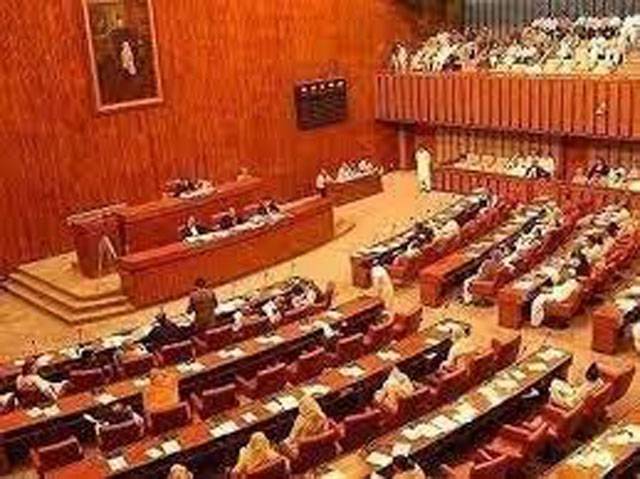ISLAMABAD-Senate Standing Committee on Commerce on Monday recommended the government to give tax incentives to the IT industry and e-commerce sector, which have potential to enhance the country’s exports.
The meeting of the Senate Standing Committee on Commerce was held at the Parliament House under the chairmanship of Senator Zeeshan Khanzada. The committee members were given a detailed presentation on the potential and performance of the IT industry and e-commerce sector. Officials told the committee that the National E-Commerce Council has been established for the development of e-commerce in the country. Pakistan is currently the 37th largest e-commerce market in the world and is growing rapidly. The committee members said that quality control is very important for the development of e-commerce so that this sector gains the trust of the people.
Senator Shaukat Tareen said that Pakistani IT freelancers have about three to four billion dollars parked outside and freelancers are shying away from bringing money into the country due to high taxes. He further said that to encourage the IT sector, they should be given tax exemption for ten years and they should also be allowed to open hundred percent foreign currency accounts. Deputy Chairman Senate Mirza Muhammad Afridi said that for the development of Pakistan’s IT export, it is necessary to bring payment gateways like PayPal. Officials said talks were held with international payment gateways PayPal and others. We are trying to start this service in Pakistan as soon as possible. Payments are currently made through a payment gateway linked to PayPal on Amazon. Senator Abdul Qadir said that e-commerce can be used to reduce the role of middlemen in the agricultural sector. This will give better price to our farmers and also make affordable commodities available to people.
A comprehensive briefing was given to the Committee on the composition, functioning and performance of the Sectoral Councils as well as the details of the members of the Sectoral Councils by the officials of the concerned Ministry. The committee was informed that the sectoral councils consist of representatives of the private sector, government sector and trade associations and efforts have been made to make all relevant manufacturers and stakeholders part of the councils. Officials further said that the purpose of forming the councils is to establish an atmosphere of trust between the government and the industry regarding policies so that business conditions in the country can be improved.
Ten sectoral councils have been established so far and three more are in progress. All the councils will play an advisory role as well as suggest new initiatives for the betterment of the industry. The chairman committee said that a sector-specific strategy should be adopted in consultation with the private sector while ensuring the representation of all provinces in these councils. Senator Shaukat Tareen said that the banks should be directed to provide loans to the business community of the smaller provinces. The matter should be taken up with the State Bank and the Ministry of Finance. Senator Danesh Kumar informed the committee regarding the illegal smuggling of fisheries within Balochistan. He said that Pakistani fishermen are forced to sell their products to big international trawlers due to lack of necessary storage and technology. If all these facilities are provided in Gwadar and adjacent areas, then the trade can be improved through legal means. The chairman of the committee directed that the information on this issue should be obtained from the provincial governments and institutions and submitted to the committee so that a policy can be formulated in this regard. Senator Mirza Muhammad Afridi said that the ban on the import of livestock from Afghanistan should be lifted.
The chairman committee directed that the damage caused to the food sector due to floods should be assessed and the food shortage should be estimated in the next year so that timely action can be taken to import necessary items, specially cotton, which can affect the future of Pakistan’s important textile industry. On inquiring about the reasons for the delay in the board meeting of TDAP the officials told the committee that the board of TDAP does not exist at the moment, the names were sent to the cabinet for formation, but the matter was delayed due to the change in the government. Officials said that after the formation of the new government, the names are being sent to the cabinet again and the board meeting will be called soon after the approval of the cabinet. The report of the sub-committee on the issue of import of gold was presented in the committee. The report will be reviewed in the next meeting of the committee.
Thursday, November 21, 2024
Senate body for giving tax incentives to IT industry, e-commerce sector

Ishaq Dar chairs meeting on solarization of agricultural tube wells
12:51 PM | November 21, 2024
Bilawal Bhutto urges federal government to reconsider Indus canal projects
12:27 PM | November 21, 2024
Petition filed in LHC against Bilawal Bhutto and Ayaz Sadiq for election act violation
12:06 PM | November 21, 2024
Pakistan to convert 30% of vehicles to electric by 2030: Aleem Khan
November 21, 2024
Iqbal’s philosophy source of inspiration for humanity, says Saif
November 21, 2024
-
Hunger crisis to increase in South Sudan, warns UN
-
Hunger crisis to increase in South Sudan, warns UN
-
Pakistan’s judiciary champions climate justice at COP29 in Baku
-
Punjab struggles with persistent smog as Met Office forecast rainfall
-
Punjab residents face escalating smog crisis as pollution levels soar across country
-
Qatar says Hamas 'no longer welcome' in Gulf state
Land of Vigilantes
November 21, 2024
United in Genocide
November 21, 2024
Finally Fighting Back
November 21, 2024
Digital Stagnation
November 20, 2024
Xi’s Red Lines
November 20, 2024
Independent Supreme Court
November 21, 2024
Fat Loss Fantasy
November 21, 2024
Tackle Corruption Within School Boards
November 20, 2024
To Be Opportunistic
November 20, 2024
Democratic Backsliding
November 20, 2024
ePaper - Nawaiwaqt
Nawaiwaqt Group | Copyright © 2024





